Comprehending ERC20 Tokens: An Exploration of SignorToken
 Emmanuel Omemgboji
Emmanuel Omemgboji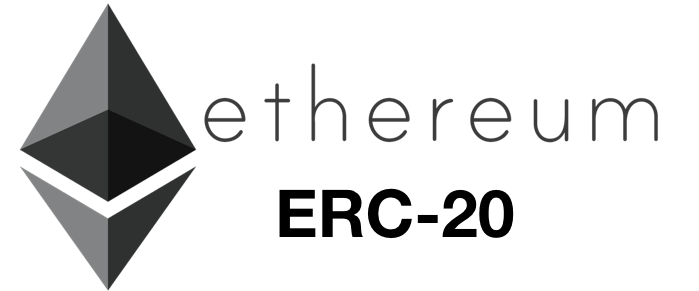
1. Understanding ERC20 Tokens
What are ERC20 Tokens?
ERC20 tokens are a type of fungible tokens standardized on the Ethereum blockchain. They adhere to a specific set of rules and functions, allowing for seamless interaction between different tokens and Ethereum-based applications. ERC20 tokens have become the foundation of the Ethereum token economy, facilitating tokenization, crowdfunding, decentralized finance (DeFi), and more.
Importance of ERC20 Standard
The ERC20 standard provides a common interface for token contracts on the Ethereum blockchain, enabling interoperability between different tokens and Ethereum-based platforms. It establishes a set of functions and events that any ERC20-compliant token must implement, ensuring compatibility and ease of use across the Ethereum ecosystem. This standardization has led to the widespread adoption of ERC20 tokens and their integration into various decentralized applications (DApps) and protocols.
2. Exploring SignorToken Contract
Overview of SignorToken Features
SignorToken is an ERC20 token contract that demonstrates the implementation of ERC20 functionalities. It includes features such as token transfers, approvals, allowances, burning, and minting. Let's delve into the details of the SignorToken contract to understand how these features are implemented.
Breakdown of SignorToken Contract
The SignorToken contract consists of state variables, mappings, constructor, events, external functions, and internal functions. Each component plays a crucial role in defining the behavior and functionality of the token contract.
3. Understanding SignorToken Features
Token Name and Symbol SignorToken contract includes state variables for storing the token's name and symbol, which are essential for identification and representation of the token in various applications and exchanges.
Total Supply and Decimals
The contract tracks the total supply of SignorToken and defines the number of decimals for the token. Decimals determine the smallest unit of the token, enabling precision in token transfers and calculations.
Token Balances and Allowances
SignorToken utilizes mappings to track token balances of addresses and allowances granted to other addresses. These mappings facilitate token transfers and delegate spending on behalf of token holders.
This is the entire contract code:

4. SignorToken Contract Walkthrough
Pragma and State Variables
The SignorToken contract begins with the pragma statement specifying the Solidity compiler version followed by the declaration of state variables. These variables include tokenName, tokenSymbol, totalSupply, and owner. They are crucial for defining the basic properties and ownership of the token contract.
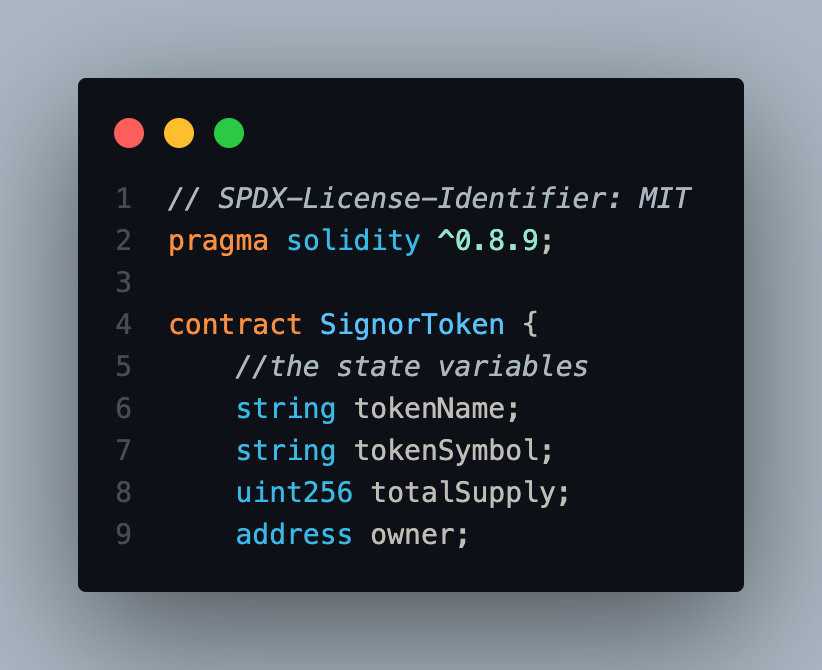
Events
After the state variables, the contract defines two events: Transfer and Approval. These events are emitted to log important transactions and approvals within the token contract. Event logging is a standard practice in Ethereum smart contract development and facilitates transparency and traceability of token transactions.
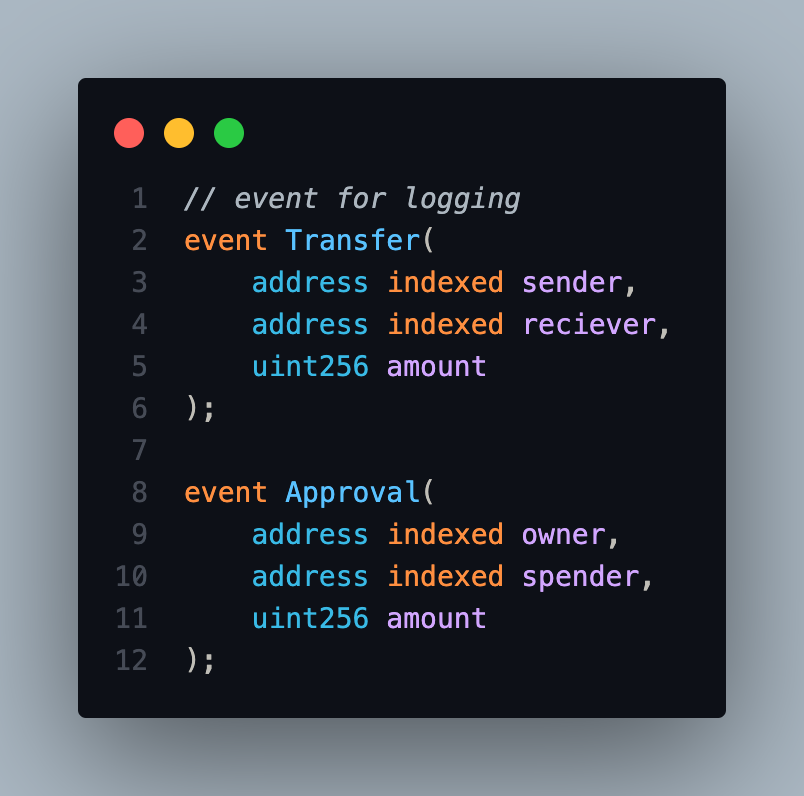
Mappings
Following the events, the contract declares two mappings: balances and allow. These mappings are used to track token balances of addresses and allowances granted to other addresses, respectively. Mappings provide efficient key-value storage and enable efficient access to token balances and allowances during token transfers and approvals.

Constructor Initialization
Upon deployment, the constructor initializes the SignorToken with a name, symbol, and initial supply. It also mints tokens to the contract owner, setting the foundation for token distribution and usage.
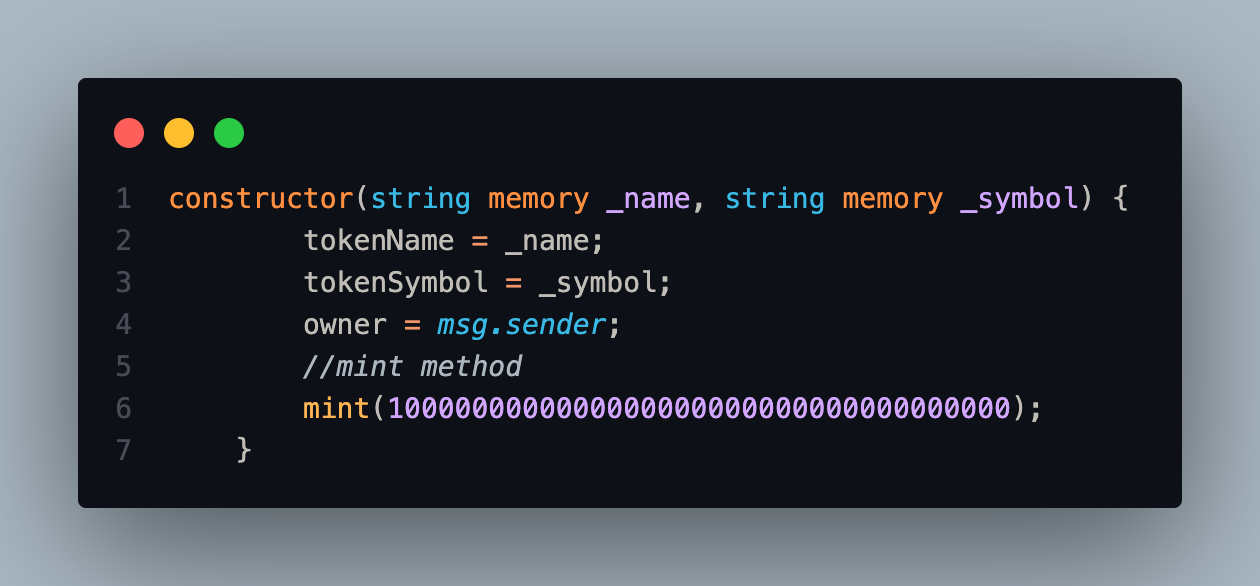
Token Transfer Mechanism
The contract implements functions for transferring tokens between addresses, ensuring that token balances are updated accurately and securely. It includes checks for sufficient balances and enforces transfer rules specified by the ERC20 standard.
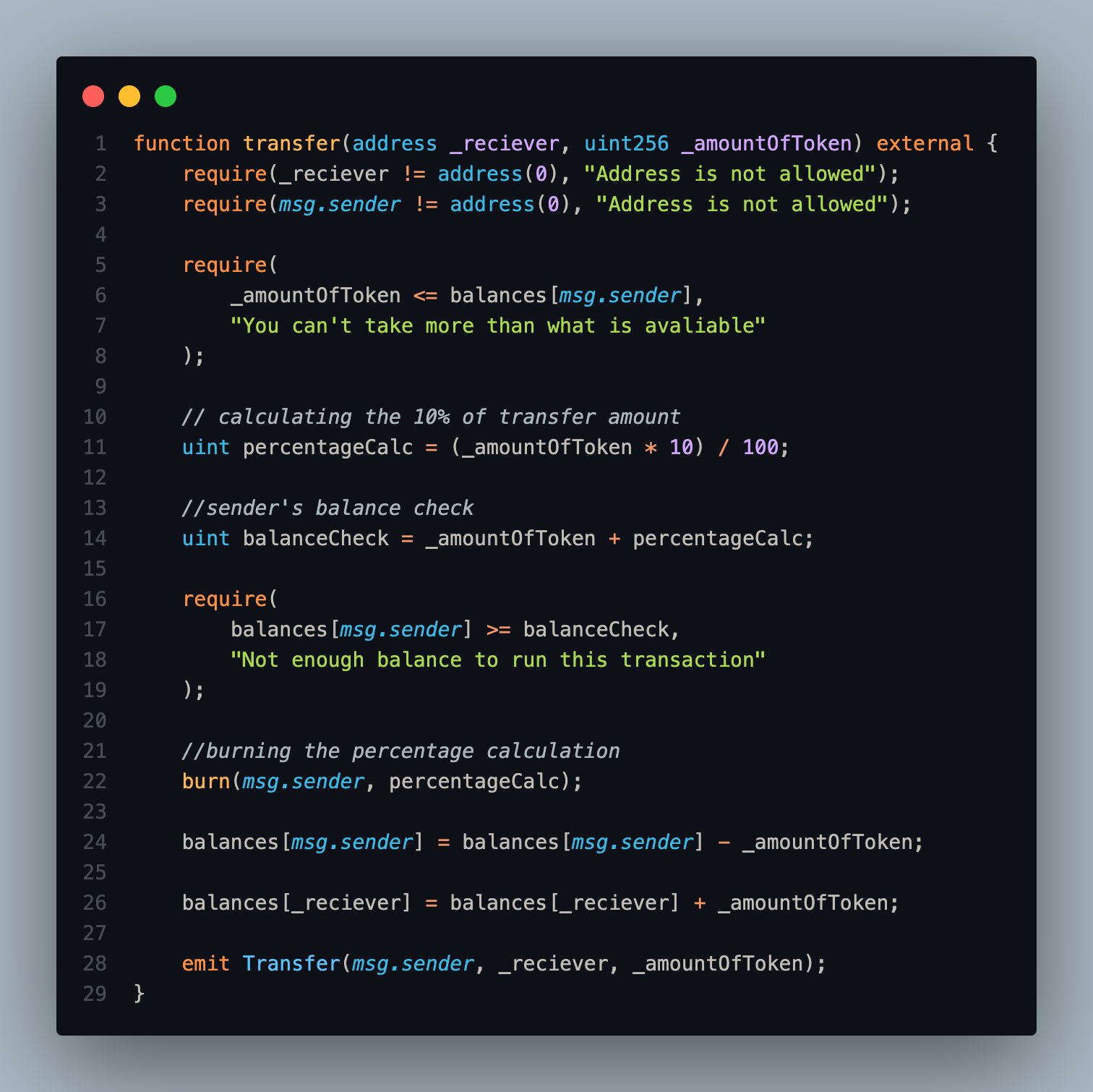
Code explanation:
The transfer function facilitates the transfer of tokens from the sender's address (msg.sender) to a specified receiver's address (_receiver). Let's break down the function's logic and the steps involved:
Input Validation:
The function begins with two
requirestatements to validate the input parameters:require(_receiver != address(0), "Address is not allowed"): Ensures that the receiver's address is not the null address (0x00), indicating a valid recipient for the token transfer.require(msg.sender != address(0), "Address is not allowed"): Ensures that the sender's address is not the null address, ensuring the validity of the sender's identity.
Balance Check:
Next, the function checks whether the sender has a sufficient balance of tokens to initiate the transfer:
require(_amountOfToken <= balances[msg.sender], "You can't take more than what is available"): Verifies that the transfer amount does not exceed the sender's balance stored in thebalancesmapping.
Fee Calculation:
The function calculates a 10% fee (
percentageCalc) based on the transfer amount:uint percentageCalc = (_amountOfToken * 10) / 100;: Computes 10% of the transfer amount as the fee to be deducted from the sender's balance.
Balance Verification:
After calculating the fee, the function checks whether the sender's balance is sufficient to cover the transfer amount and the fee:
uint balanceCheck = _amountOfToken + percentageCalc;: Calculates the total amount to be deducted from the sender's balance, including the transfer amount and the fee.require(balances[msg.sender] >= balanceCheck, "Not enough balance to run this transaction"): Ensures that the sender's balance is equal to or greater than the calculated total, indicating sufficient funds to execute the transfer along with the fee.
Fee Deduction (Burning):
If the sender's balance is sufficient, the function proceeds to deduct the fee from the sender's balance by burning tokens:
burn(msg.sender, percentageCalc);: Invokes theburnfunction to burn the calculated fee (percentageCalc) from the sender's balance, reducing the total token supply.
Token Transfer:
After deducting the fee, the function transfers the specified amount of tokens from the sender to the receiver:
balances[msg.sender] -= _amountOfToken;: Subtracts the transfer amount from the sender's balance.balances[_receiver] += _amountOfToken;: Adds the transfer amount to the receiver's balance.emit Transfer(msg.sender, _receiver, _amountOfToken);: Emits aTransferevent to log the successful transfer of tokens from the sender to the receiver.
Approval and Allowance Mechanism
SignorToken allows token holders to approve other addresses (delegates) to spend tokens on their behalf. This mechanism, along with allowances, enables decentralized token management and delegation of authority.
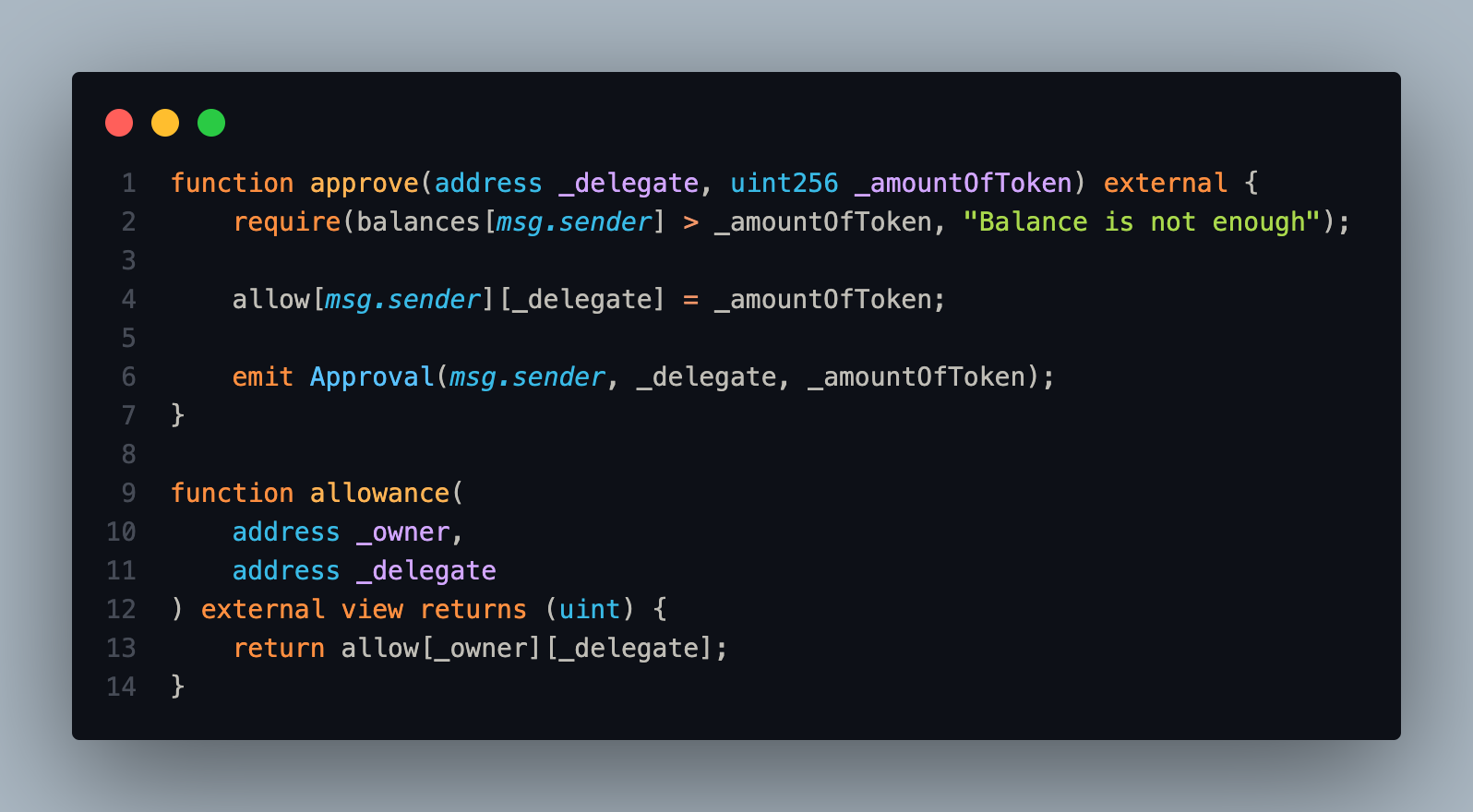
Explanations:
The approve function allows the owner of SignorToken to approve a delegate (another address) to spend a specified amount of tokens on their behalf. Let's break down the steps involved:
Input Validation:
- The function starts with input validation, ensuring that the owner has sufficient balance to approve the desired token amount for spending by the delegate. This is enforced by the
requirestatement, which checks if the balance of the owner (msg.sender) is greater than the_amountOfTokenbeing approved.
- The function starts with input validation, ensuring that the owner has sufficient balance to approve the desired token amount for spending by the delegate. This is enforced by the
Allowance Assignment:
- If the input validation passes, the function proceeds to update the allowance mapping (
allow) to grant approval to the delegate (_delegate) for spending the specified amount of tokens. This is achieved by assigning_amountOfTokento the corresponding entry in theallowmapping, where the key is the owner's address (msg.sender) and the value is the delegate's address (_delegate).
- If the input validation passes, the function proceeds to update the allowance mapping (
Event Emission:
- After updating the allowance, the function emits an
Approvalevent to log the approval transaction. This event provides transparency and allows external parties to monitor and track token approvals on the SignorToken contract.
- After updating the allowance, the function emits an
The allowance function allows any external party to query the amount of tokens approved for spending by a specific delegate on behalf of a token owner. Here's how the function works:
Input Parameters:
- The function takes two input parameters:
_owner(the token owner's address) and_delegate(the delegate's address). These parameters specify the token owner and the delegate for whom the allowance is being queried.
- The function takes two input parameters:
Read-Only Function:
- The function is marked as
external view, indicating that it is a read-only function and does not modify the state of the contract. It solely retrieves and returns data from theallowmapping.
- The function is marked as
Allowance Retrieval:
- Inside the function, it retrieves the allowance granted to the
_delegateby the specified_ownerfrom theallowmapping. This is accomplished by accessing the corresponding entry in theallowmapping using_ownerand_delegateas keys.
- Inside the function, it retrieves the allowance granted to the
Return Value:
- Finally, the function returns the retrieved allowance amount as a
uint, providing external callers with the approved token amount for spending by the specified delegate on behalf of the token owner.
- Finally, the function returns the retrieved allowance amount as a
These two functions, approve and allowance, work in conjunction to enable token owners to delegate spending authority to other addresses and allow external parties to query the approved allowance for specific delegates. Together, they facilitate decentralized token management and enable secure and transparent token transfers within the SignorToken ecosystem.
TransferFrom
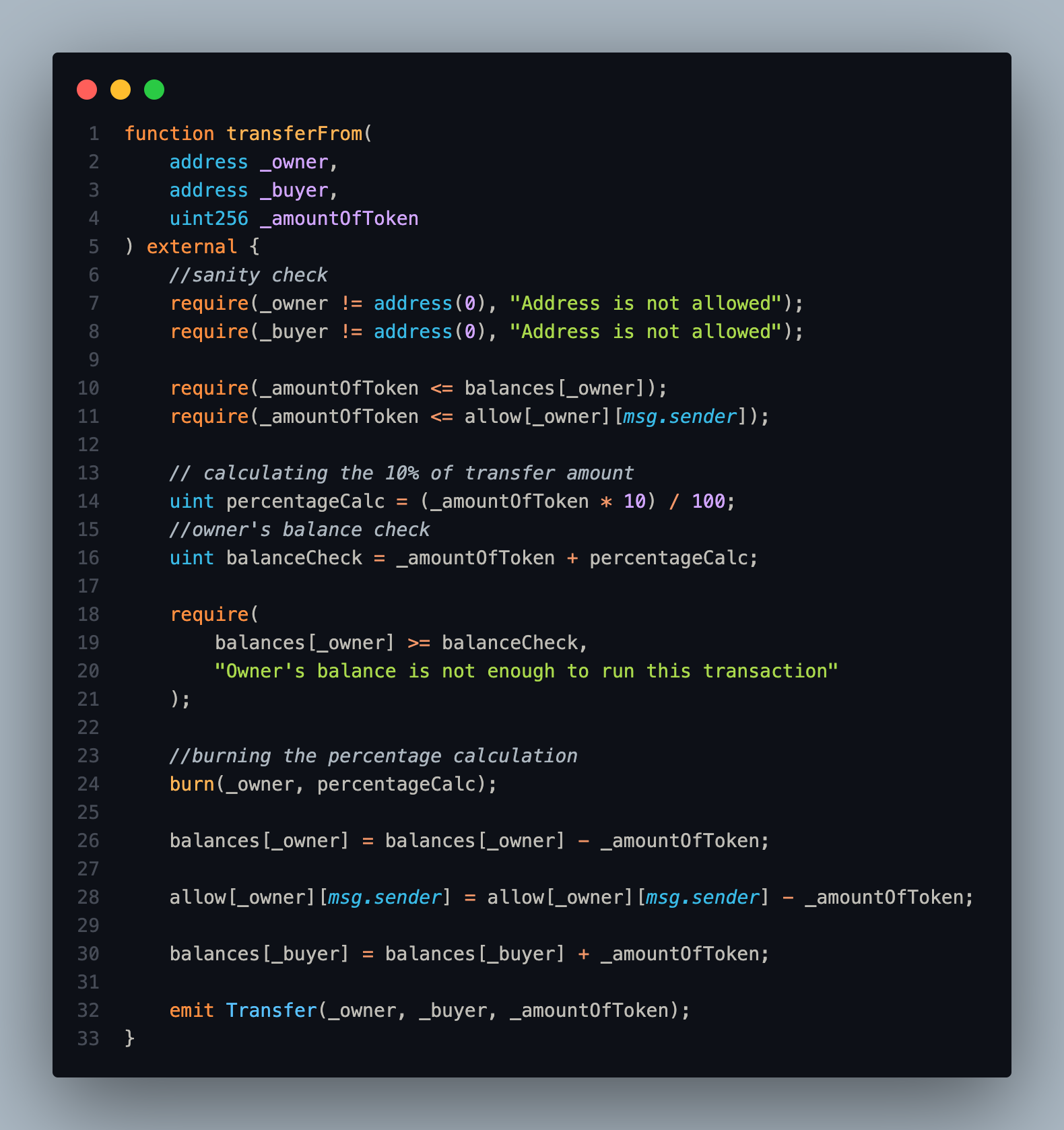
The transferFrom function facilitates the transfer of tokens from one address (the owner) to another address (the buyer), with the approval of a delegate (the sender). This function is commonly used in scenarios where a token holder delegates another address to transfer tokens on their behalf, such as in decentralized exchanges or automated trading strategies.
Function Parameters:
_owner: The address from which the tokens are being transferred._buyer: The address to which the tokens are being transferred._amountOfToken: The amount of tokens to transfer from the owner to the buyer.
Sanity Checks:
- The function starts with sanity checks to ensure that both the owner's and the buyer's addresses are valid (
_owner != address(0)and_buyer != address(0)).
Balance and Allowance Checks:
- Next, the function checks if the
_ownerhas sufficient balance and if the delegate (msg.sender) has been approved to spend the specified_amountOfTokentokens on behalf of the owner. These checks are essential to prevent unauthorized token transfers and ensure that the transaction adheres to the approved allowance.
Percentage Calculation:
- The function calculates a 10% fee (
percentageCalc) based on the transferred_amountOfToken. This fee is deducted from the transferred amount to account for a transaction fee or any other applicable charges.
Owner's Balance Check:
- After calculating the total transfer amount including the fee (
balanceCheck), the function verifies that the owner's balance is sufficient to cover the transfer amount plus the fee. If the owner's balance is insufficient, the function reverts with an error message indicating that the owner's balance is not enough to execute the transaction.
Burning Tokens:
- Upon successful balance and allowance checks, the function proceeds to burn the calculated fee (
percentageCalc) from the owner's balance. Burning tokens reduces the total token supply and is commonly used for various purposes such as deflationary mechanisms or transaction fees.
Token Transfer:
- After burning the fee, the function deducts the transferred
_amountOfTokentokens from the owner's balance and updates the allowance of the delegate (msg.sender). It then adds the transferred tokens to the buyer's balance.
Event Emission:
- Finally, the function emits a
Transferevent to log the token transfer from the owner to the buyer, providing transparency and allowing external parties to track token movements on the blockchain.
The transferFrom function enables seamless and secure token transfers with the approval and delegation mechanism, enhancing the flexibility and utility of ERC20 tokens in decentralized applications and token ecosystems.
Burning Tokens
The contract includes a function for burning tokens, reducing the total supply and removing tokens from circulation. Burning tokens can serve various purposes, such as deflationary mechanisms and tokenomic adjustments.
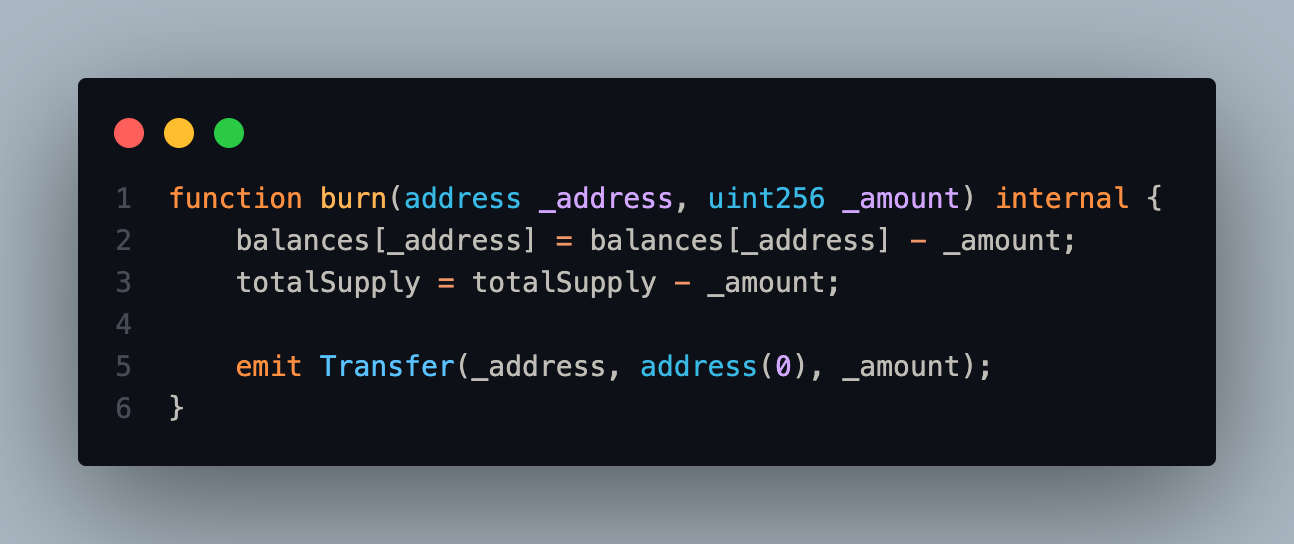
Minting Tokens
SignorToken provides a function for minting new tokens, which increases the total supply and expands the token ecosystem. Minting is typically restricted to specific addresses, such as the contract owner, to maintain tokenomics and prevent inflationary pressures.
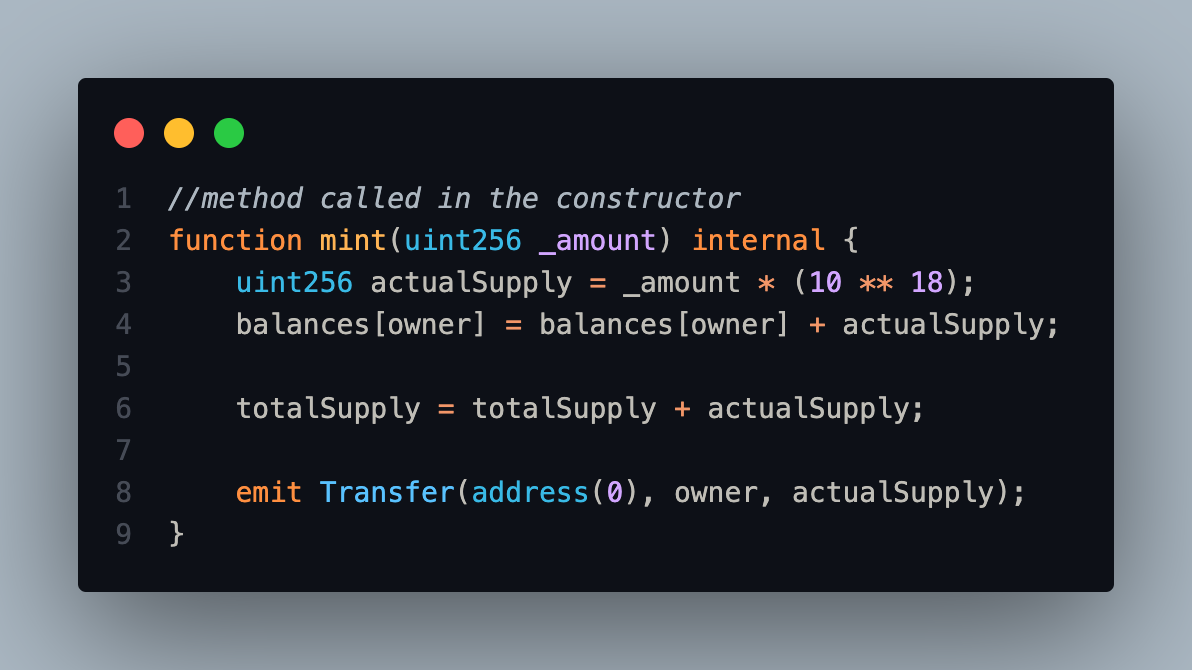
5. Implementing SignorToken in Practice
Deploying SignorToken Contract
Developers can deploy the SignorToken contract on the Ethereum blockchain using smart contract development tools like Hardhat, Truffle, or Remix. Deployment parameters such as name, symbol, and initial supply can be customized based on project requirements.
So this SignorToken contract was deployed and verified on sepolia testnet using hardhat:
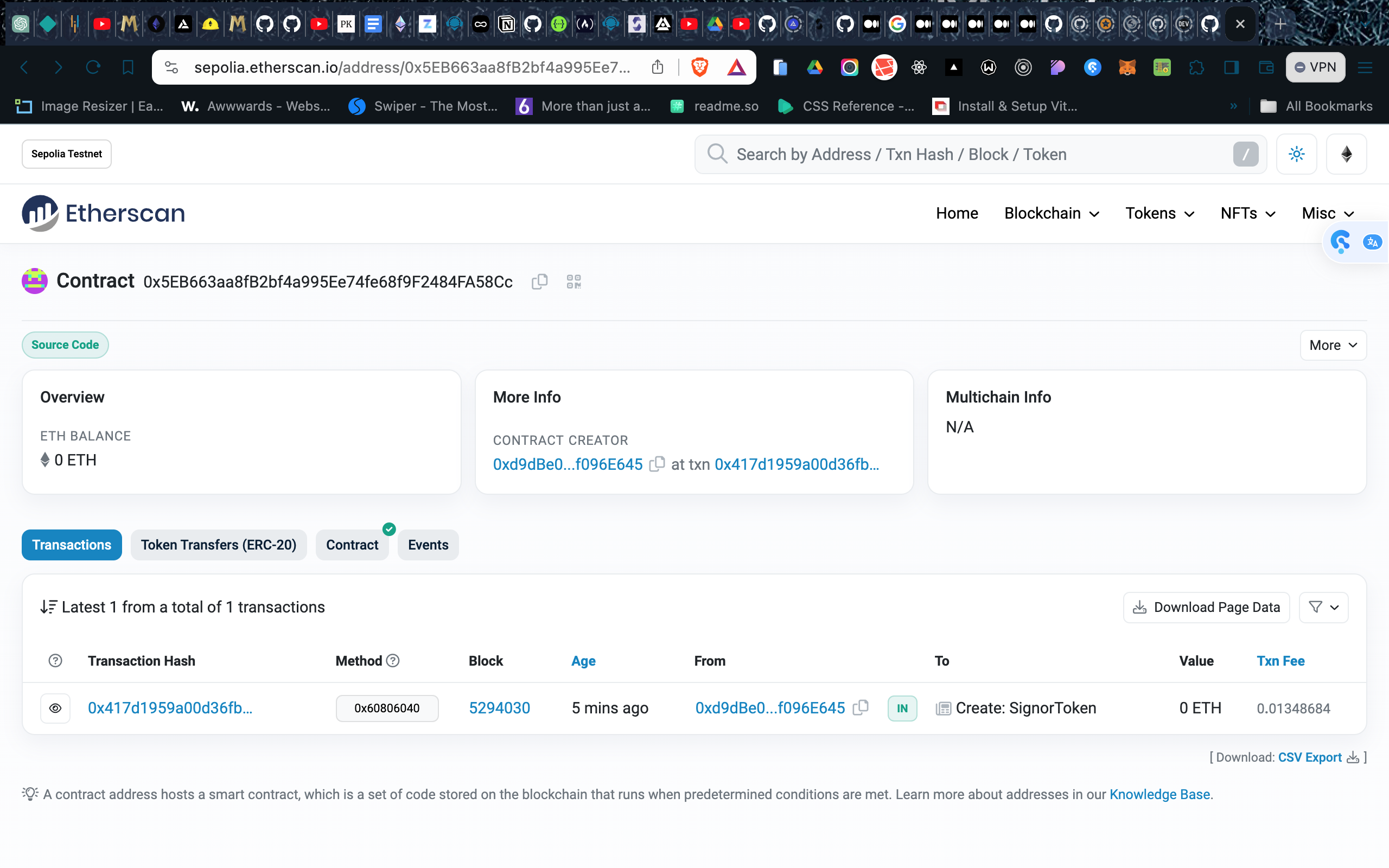
Interacting with SignorToken Once deployed, SignorToken can be interacted with using Ethereum wallets, DApps, or custom applications. Users can transfer tokens, approve spending, check balances, and utilize various token functionalities provided by the contract.
6. Conclusion
SignorToken exemplifies the implementation of ERC20 functionalities, providing a robust framework for token management and interaction. Its features, including token transfers, approvals, burning, and minting, showcase the versatility and utility of ERC20 tokens in the Ethereum ecosystem.
Subscribe to my newsletter
Read articles from Emmanuel Omemgboji directly inside your inbox. Subscribe to the newsletter, and don't miss out.
Written by

Emmanuel Omemgboji
Emmanuel Omemgboji
I'm a passionate developer with a keen interest in web development and everything techie. I'm on a journey to explore the ever-evolving world of software technologies and share my insights along the way.